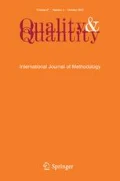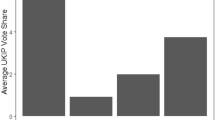Abstract
The prospective through which United Kingdom (England, Scotland, Wales and Northern Ireland) voted in a referendum to Leave the European Union is known as Brexit. In this research, we discuss the effects of Brexit on United Kingdom economy and to accomplish this task, we have analysed the Pre-Brexit Polling and Post-Brexit Polling economic data and indicators. Different econometric tests are used for analysis and coefficient’s estimation. Three key economic variables are used: Exchange Rate (US dollar to GB Pound), Gold Price and Oil Price. These key variables are famous due to their volatile nature and thus play an important role in the economic growth. The analyses define distinguish effect in coefficients, elements, shocks and attributes on United Kingdom economy by these three key variables in the time frame of Pre and Post Brexit polling.











Similar content being viewed by others
References
Dickey, D.A., Fuller, W.A.: Likelihood ratio statistics for autoregressive time series with a unit root. Econometrica 49(4), 1057–1072 (1981)
Engle, R.F., Lee, G.J.: A long run and short run component model of stock return volatility. In: Engle, R.F., White, H. (eds.) Cointegration, Causality and Forecasting: A Festschrift in Honour of Clive W. J. Granger, pp. 475–497. Oxford University Press, Oxford (1999)
Fanchon, P., Wendel, J.: Estimating VAR models under non-stationarity and cointegration: alternative approaches for forecasting cattle prices. Appl. Econ. 24, 207–217 (1992)
Granger, C.W.J.: Investigating causal relations by econometric methods and cross spectral methods. Econometrica 34, 424–438 (1969)
Hantrais, L. (2017). The Social Dimension in EU and UK Policy Development: Shaping the Post-Brexit Legacy. Working Paper CIS/2017/04, Centre for International Studies London School of Economics
Johansen, S.: Statistical analysis of cointegrated vectors. J. Econ. Dyn. Control 12(213), 231–254 (1988)
Johansen, S., Juselius, K.: Maximum likelihood estimation and inference on cointegration with applications to the demand for money. Oxford Bull. Econ. Stat. 52(2), 169–210 (1990)
Kuper, G., van Soest, D.: Does oil price uncertainty affect energy use? Energy J. 27, 55–78 (2006)
Kwiatkowski, D., Phillips, P.C.B., Schmidt, P., Shin, Y.: Testing the null hypothesis of stationarity against the alternative of a unit root: How sure are we that economic time series have a unit root?. J. Econ. 54, 159–78 (1992)
Ng, H., Lam, K.P.: How does the sample size affect GARCH models? In: Proceedings of the Joint Conference on Information Sciences (2006)
Phillips, P.C.B., Perron, P.: Testing for a unit root in time series regression. Biometrika 75(2), 335–346 (1988)
Walker, N.: Brexit timeline: events leading to the UK’s exit from the European Union. Briefing Paper Number 07960, House of Commons Library (2017)
Author information
Authors and Affiliations
Corresponding author
Rights and permissions
About this article
Cite this article
Jawad, M., Naz, M. Pre and post effects of Brexit polling on United Kingdom economy: an econometrics analysis of transactional change. Qual Quant 53, 247–267 (2019). https://doi.org/10.1007/s11135-018-0746-1
Published:
Issue Date:
DOI: https://doi.org/10.1007/s11135-018-0746-1




